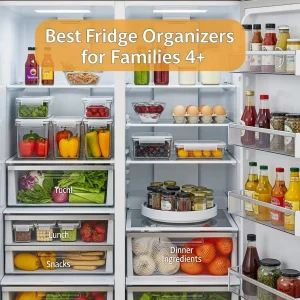Yes, a smart fridge is considered an IoT (Internet of Things) device because it connects to the internet and can communicate with other devices, enabling remote control and monitoring. It uses sensors and technology to automate tasks like tracking inventory and adjusting temperatures.
Now let’s describe “Is a smart fridge an IoT?”
Definition of IoT

The Internet of Things (IoT) is a network of interconnected devices that communicate with each other through the Internet, allowing for seamless data exchange and remote management. Imagine your home filled with smart appliances – lights that turn on automatically, thermostats that adjust to your preferences, and even refrigerators that can do grocery shopping for you!
This interconnectedness makes it possible for these devices to work together, creating a more convenient lifestyle. For instance, you might receive an alert on your phone when your smart fridge detects that you’re running low on milk.
This ability to communicate not only streamlines household tasks but also promotes energy efficiency and resource management, making the IoT a vital component of modern living.
Overview of Smart Fridges
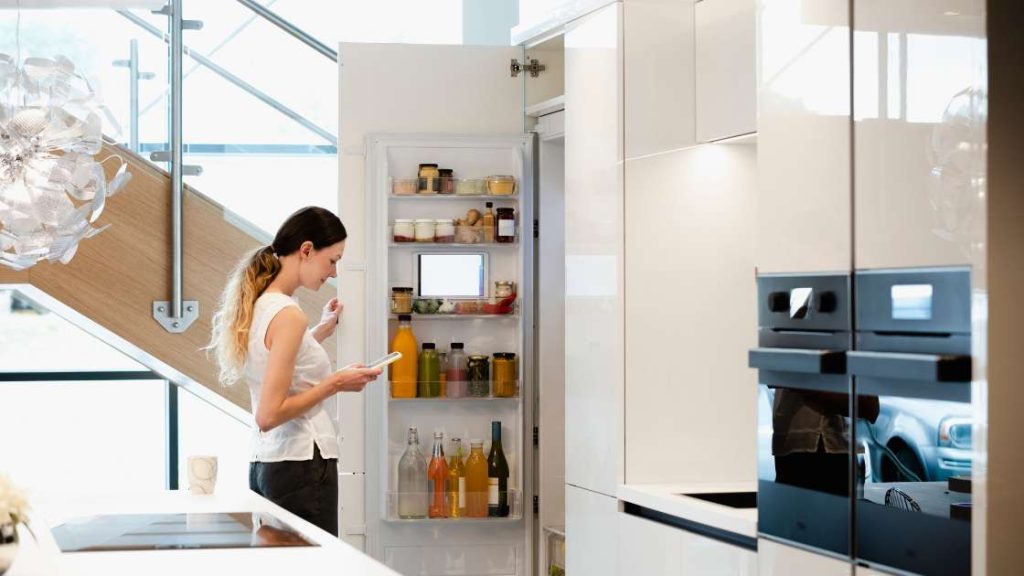
Smart fridges have emerged as popular IoT devices that redefine the way we manage food in our kitchens. Unlike traditional refrigerators, smart fridges come equipped with advanced technology that allows them to perform a range of functions beyond mere cooling. Here are some key features commonly found in smart fridges:
- Food Inventory Management: Track what’s inside your fridge with sensors that recognize items and expiration dates.
- Remote Access and Control: Manage your fridge from anywhere; check contents or adjust temperatures through a smartphone app.
- Integration with Other Smart Home Devices: Connect seamlessly with other IoT devices, creating an interconnected ecosystem that simplifies daily routines.
With smart fridges, families can save time, reduce food waste, and enhance their culinary experiences. Imagine being able to plan meals with the touch of a button or knowing precisely what items you have at home when you’re out shopping.
As IoT continues to evolve, these appliances are transforming the connected kitchen into a hub of convenience, enriching our everyday lives.
Functionality of Smart Fridges
Food Inventory Management
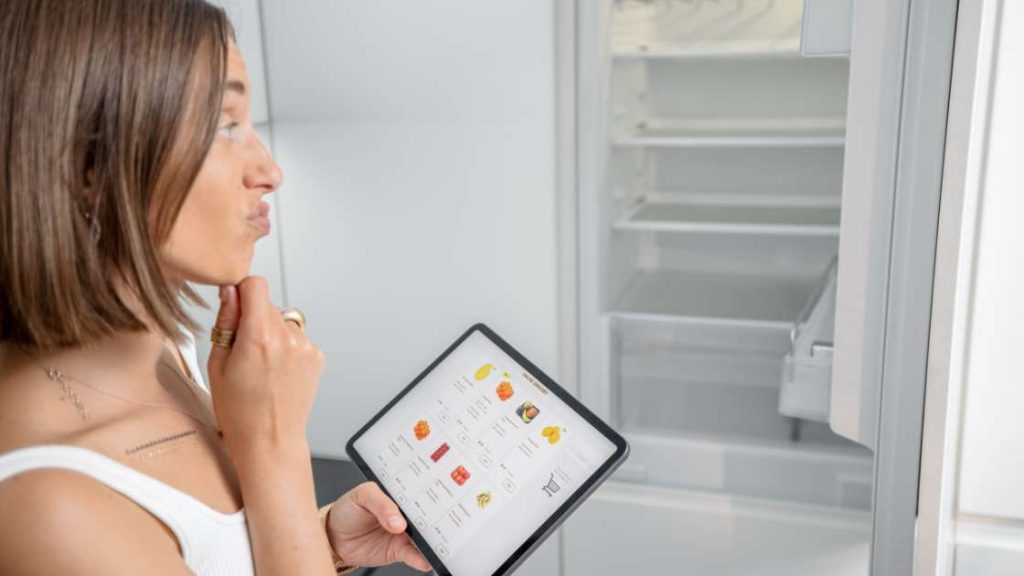
One of the standout functionalities of smart fridges is their food inventory management system. Picture this: you open your fridge, and instead of a jumbled mess, you find an organized display of what you have on hand.
Smart fridges utilize internal cameras and barcode scanners to keep track of your groceries. For example, when you place a new item inside the fridge, it can automatically log it. If you’re someone who often forgets what’s expiring, smart fridges can send you notifications when items are approaching their use-by date.
This not only helps in meal planning but significantly reduces food waste. Here are some of the benefits of food inventory management in smart fridges:
- Automatic Inventory Updates: No more guessing what you need to buy next.
- Meal Suggestions: Based on the ingredients you have, some smart fridges can suggest recipes.
- Expiration Alerts: Receive reminders on soon-to-expire items to use them timely.
Remote Access and Control
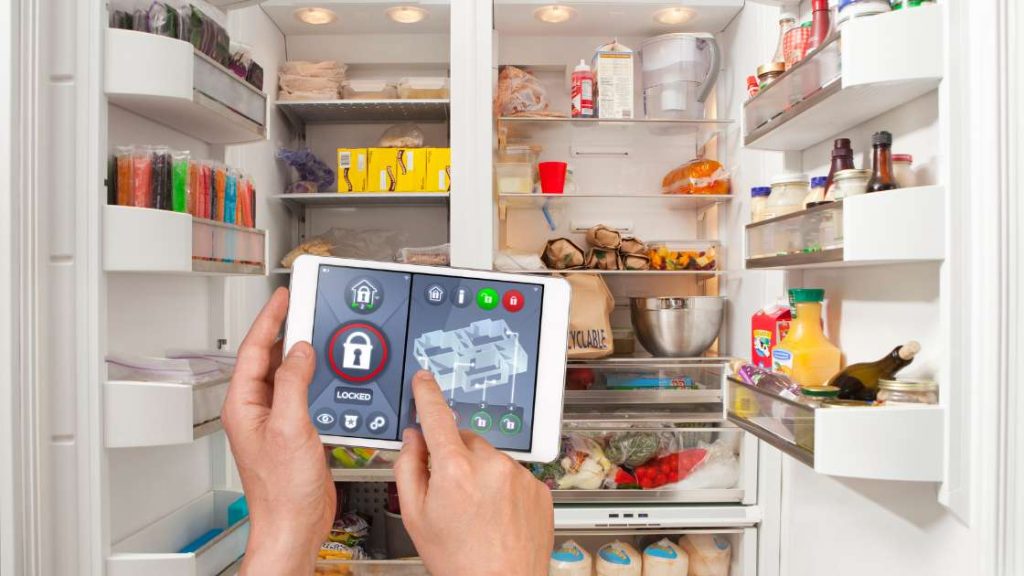
In our fast-paced world, the ability to manage appliances from a distance is a game-changer. Smart fridges offer remote access and control through dedicated apps, making it easier than ever to stay on top of your kitchen needs.
Imagine you’re at the grocery store, staring blankly at the milk aisle when you suddenly think, “Do I even need more milk?” With a smart fridge, you can check its contents in real time via your smartphone. Key features of remote access include:
- Temperature Control: Adjust the internal temperature from your app if you’re coming home with a warm batch of groceries.
- Shopping Lists: Create and update your grocery lists directly from the fridge app.
- Food Management Alerts: Get notifications if someone leaves the fridge door open.
With these functionalities, smart fridges are not just appliances; they are integral pieces of technology that enhance our daily lives and promote efficiency in kitchen management.
Connectivity Features
Wi-Fi and Bluetooth Capabilities
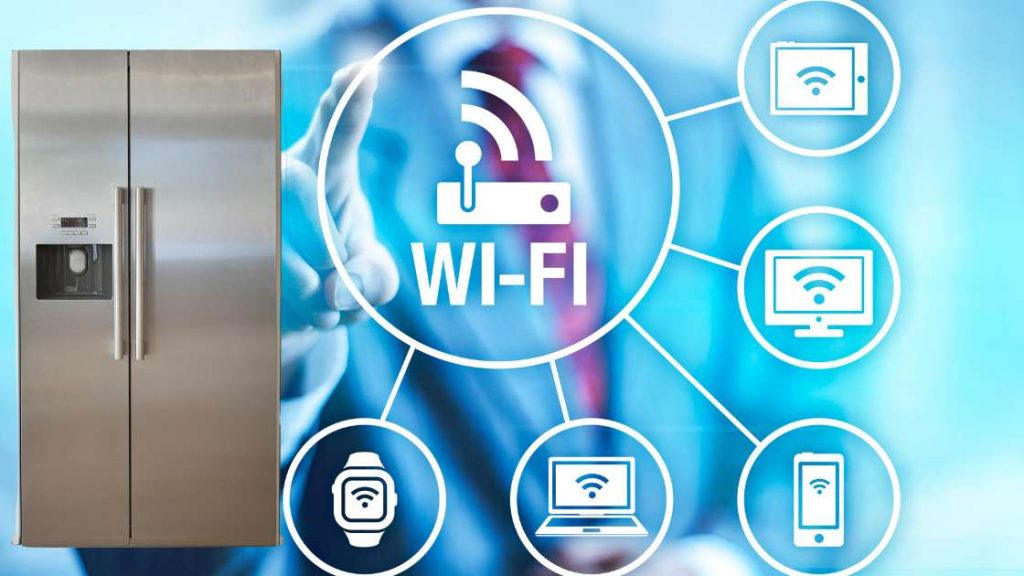
The connectivity features of smart fridges are what truly make them stand out in the realm of kitchen appliances. Equipped with Wi-Fi and Bluetooth capabilities, these fridges allow for seamless communication with other devices while providing a host of interactive features that simplify meal management and grocery shopping.
Using Wi-Fi, smart fridges can connect to the internet, enabling users to access a wide array of functionalities remotely. For instance, imagine you’re in the middle of cooking dinner and realize you’re out of a key ingredient. With just a few taps on your smartphone, you can easily check your fridge’s inventory or order groceries directly from your app.
Conversely, Bluetooth connectivity allows for quick pairing with smartphones or other devices without the need for Wi-Fi. This can be useful for tasks like downloading recipes or syncing your shopping list. Some key benefits of Wi-Fi and Bluetooth capabilities include:
- Real-Time Notifications: Get alerts about food expiration or when fridge doors are left ajar.
- Instant Recipe Access: Quickly pull up cooking instructions without leaving the kitchen.
Integration with Smart Home Systems
Smart fridges are designed to be more than just stand-alone devices; their integration with broader smart home systems makes them integral to a connected kitchen. Imagine waking up in the morning, and your fridge can communicate with your smart coffee maker to start brewing while you are still in bed.
By integrating with platforms like Amazon Alexa or Google Assistant, smart fridges can respond to voice commands, allowing you to manage schedules, create shopping lists, and even get nutritional information without lifting a finger. Consider the following advantages of this integration:
- Centralized Control: Manage all your smart appliances from a single app or voice control system.
- Enhanced Automation: Set your fridge to remind you to take out ingredients for dinner at a certain time.
- Energy Management: Monitor energy usage and adjust settings based on peak consumption times.
With such robust connectivity features, smart fridges not only streamline kitchen tasks but also enhance the overall smart home experience, making daily chores feel more manageable.
Security Concerns
Data Privacy Issues
While smart fridges offer incredible convenience, they also come with significant security concerns, particularly regarding data privacy. As these appliances connect to the internet and track user behavior, they can collect sensitive information about your household’s eating habits and routines.
Imagine setting your fridge to monitor your meals and sending shopping lists directly to your smartphone. While this functionality is helpful, it raises questions about who has access to this data. Here are a few key concerns about data privacy:
- Data Sharing: Some manufacturers may share usage data with third parties for marketing purposes, often without explicit user consent.
- Permanent Digital Footprint: Smart fridges can store your dietary habits, making your habits more visible to advertisers or hackers.
- Unintentional Access: If you give guests temporary access to your home network, they might inadvertently access your fridge’s data.
Vulnerabilities to Cyber Attacks
Another critical concern revolves around the potential vulnerabilities to cyber-attacks. Just like other IoT devices, smart fridges can become targets for hackers looking to exploit weaknesses in software or networking protocols.
For instance, a poorly secured fridge could be hacked, allowing intruders to manipulate settings or access private information. Here’s what you might consider to protect your fridge from cyber threats:
- Regular Firmware Updates: Keeping your fridge’s software up-to-date minimizes vulnerabilities that hackers can exploit.
- Strong Passwords: Create complex passwords and change them regularly to prevent unauthorized access.
- Network Security: Ensure that your home Wi-Fi is secure, with strong encryption, to protect all connected devices.
While the advantages of smart fridges are undeniable, being aware of the associated security risks is crucial for any tech-savvy homeowner. By practicing good data security habits and staying informed, users can enjoy the smart features of their fridges while safeguarding their privacy.
Benefits of Using a Smart Fridge
Improved Energy Efficiency
One of the standout advantages of smart fridges is their remarkable energy efficiency. Unlike traditional refrigerators that constantly run without consideration of internal conditions, smart fridges are equipped with sensors and algorithms that monitor and adjust energy usage in real-time.
For example, these fridges can optimize cooling based on the contents and frequency of door openings, ensuring that electricity is used effectively. You might think about your old fridge, which seemed to run constantly, leading to high electricity bills.
A smart fridge, on the other hand, might help you realize a significant reduction in energy consumption. Here are some energy efficiency benefits:
- Adaptive Cooling: Smart fridges can change cooling levels based on what’s inside, leading to lower energy use.
- Energy Monitoring: Many smart fridges have apps that provide insights into energy consumption, letting users adjust habits to save on utility bills.
- Eco Modes: Some models come with energy-saving modes to minimize power use during periods of inactivity.
Enhanced User Experience
In addition to energy efficiency, smart fridges significantly enhance user experience, blending technology with everyday life in ways previously unimaginable. Picture this: after a long day, you come home, and your fridge greets you with a curated meal suggestion based on the ingredients you already have on hand.
This level of interaction simplifies meal planning and prevents the dreaded question, “What’s for dinner?” Here are some user experience benefits:
- Personalized Meal Planning: Automated recommendations based on dietary preferences and available ingredients help maximize your culinary creativity.
- Family Sharing: Families can share access to the fridge’s inventory, making it easier to plan meals together and track what needs replenishing.
Embracing this technology not only contributes to a greener home but also enhances daily life, making routines smoother and more enjoyable.
Smart Fridges vs Traditional Fridges

Comparison of Features
When weighing the benefits of smart fridges against traditional fridges, it becomes clear that each type has its own strengths and weaknesses. Traditional fridges have served households well for decades, keeping food fresh but lacking the interactive features we now crave in a tech-driven world.
Let’s take a closer look at a few key features that set smart fridges apart:
| Feature | Smart Fridge | Traditional Fridge |
|---|---|---|
| Food Tracking | Automated inventory management and expiration alerts | No tracking; everything is manual |
| Remote Access | Smartphone control and notifications | None |
| Energy Efficiency | Adaptive cooling and energy monitoring | Fixed cooling; no insights |
| Integration | Compatible with other smart home devices | No connectivity options |
You might find that while a traditional fridge can hold your food, a smart fridge actively engages with you to make your life easier, suggesting recipes based on what’s inside and alerting you when groceries are running low.
Long-Term Cost Analysis
While smart fridges often come with a higher initial price tag, many homeowners find that their long-term costs can be more favorable than those of traditional fridges. Here’s a breakdown of the financial implications:
- Energy Savings: With advanced efficiency features, smart fridges can lead to lower electricity bills over time.
- Reduced Food Waste: Inventory management means fewer expired items, ultimately saving you money on groceries.
- Potential Repairs: Traditional fridges often come with fewer features, leading to potential repair costs as they age, while smart fridges generally have warranty options covering advanced components.
That said, the initial investment in a smart fridge can be offset by the savings achieved through enhanced energy efficiency and minimized food waste. In conclusion, when contemplating whether to invest in a smart fridge or stick with a traditional model, a variety of factors come into play.
Understanding the differences in features and considering the potential long-term costs can assist consumers in making a well-informed choice suitable for their lifestyle and budget.
Future Trends in Smart Fridges
Artificial Intelligence Integration
As technology continues to advance, the future of smart fridges is increasingly intertwined with artificial intelligence (AI). This integration is set to revolutionize how we interact with our kitchens. Just imagine a fridge that learns your habits, preferences, and dietary needs over time, becoming a personalized assistant in managing your food.
For example, an AI-enabled fridge could analyze what you consume most frequently and suggest recipes that align with your tastes. Or, consider a scenario where your fridge automatically orders groceries based on the depletion of your most-used items.
This level of personalization not only saves you time but also minimizes food waste and simplifies meal planning. Some potential features of AI integration in smart fridges include:
- Predictive Analytics: AI algorithms could predict what you might need based on past purchases and family preferences.
- Recipe Optimization: Suggesting recipes based on available ingredients that cater to your personal dietary restrictions.
- Nutritional Insights: Providing feedback on the nutritional quality of your meals.
Customization Options
Another trend shaping the future of smart fridges is increased customization. As more manufacturers recognize the importance of personalization, smart fridges will likely offer bespoke features and settings tailored to individual user preferences.
Think about it: a fridge that can adjust its compartment temperatures based on the specific items you store—from beverages to fruits and vegetables—ensuring optimal preservation.
Additionally, users may be able to customize the screen display to show meal plans, grocery lists, or even family photos. Some customization features may include:
- Adjustable Shelving: Configure the interior layout to accommodate larger items or specific categories of food.
- Personalized Alerts: Set reminders for specific foods or meals tailored to your lifestyle.
- Modular Add-Ons: The ability to purchase and attach additional components, such as a coffee maker or blender that syncs with the fridge’s system.
As smart fridges evolve, the incorporation of AI and a greater focus on customization will significantly enhance user experience. By embracing these future trends, homeowners can enjoy a cooking and food management experience that is not only efficient but also uniquely tailored to their lifestyles.
Environmental Impact
Sustainability Practices
As the world turns increasingly towards eco-friendliness, smart fridges are stepping up to the plate with sustainability practices that benefit both consumers and the planet. One of the most notable advancements is the energy-efficient technology employed in many modern models.
By utilizing features like adaptive cooling and energy monitoring, smart fridges consume significantly less energy than their traditional counterparts. Imagine this: your fridge senses that it’s nighttime and adjusts its power usage accordingly, reducing overall consumption and your electricity bill!
Additionally, many manufacturers are incorporating sustainable materials in the design and construction of smart fridges. Some key sustainability practices include:
- Energy Star Certification: Look for fridges with this certification to ensure you’re getting an energy-efficient appliance.
- Eco-Friendly Refrigerants: The choice of refrigerants in smart fridges is becoming more environmentally responsible, reducing greenhouse gas emissions.
- Supply Chain Transparency: Brands are increasingly sharing information about the sustainability of their sourcing and production methods.
Recycling and Disposal Considerations
When it comes to the end of a smart fridge’s life cycle, recycling and proper disposal are crucial to minimize environmental impact. Unlike traditional appliances, smart fridges often contain additional electronics and components that require careful handling.
Before parting with an old fridge, consider these recycling and disposal tips:
- Manufacturer Take-Back Programs: Many manufacturers offer programs to recycle your old fridge responsibly. Always check if they provide this service.
- Local E-Waste Recycling: Find out if your community has e-waste recycling events where you can drop off appliances safely.
- Hazardous Material Awareness: Be aware that fridges contain materials like refrigerants that can be harmful to the environment if released. Always contact professionals for proper disposal.
Being conscious of these practices and responsibilities as a consumer not only contributes to a healthier planet but also encourages manufacturers to continue innovating in the realm of sustainable practices.
As smart fridges evolve, their role in promoting sustainability and responsible recycling will play a significant part in shaping a greener future for all.
Conclusion
In the ever-evolving landscape of home appliances, smart fridges are undeniably at the forefront, blending technology and convenience to transform our kitchens. From their innovative features such as food inventory management and energy efficiency to the integration of artificial intelligence, these modern marvels are making everyday tasks simpler and more manageable.
Reflecting on the journey through the various facets of smart fridges, it’s evident that they offer significant advantages over traditional models. Not only do they enhance user experience with customization options, but they also promote sustainable practices that benefit the environment. Consider these key points:
- Increased Efficiency: Smart fridges consume less energy while providing real-time data, helping users make informed decisions.
- Personalization: The future of smart fridges promises even more customization, making them tailored to fit unique lifestyles.
- Sustainability Focus: Their role in promoting eco-friendly practices and responsible disposal sets a positive precedent for the future of home appliances.
As we look forward, the innovation surrounding smart fridges will only continue to grow. They will undoubtedly play a significant role in the connected kitchen and the broader IoT ecosystem.
So, as you ponder your next appliance upgrade, consider the possibilities that come with embracing this technology. Investing in a smart fridge isn’t just about convenience—it’s about making a choice that positively impacts your life and the environment.
Smart fridges are not merely appliances; they are companions in our culinary journeys, paving the way for a more sustainable and enjoyable future in our kitchens.
FAQs for Is a smart fridge an IoT
As the world of smart fridges gains traction, many people have questions. Whether you are considering a purchase or simply curious about this technology, here are some frequently asked questions that can provide clarity and insights.
What is a smart fridge, and how does it work?
A smart fridge is an Internet of Things (IoT) device that connects to your home network, allowing you to interact with it via a smartphone app or voice commands. By utilizing sensors and cameras, these fridges can track inventory, monitor temperature, and even suggest recipes based on available ingredients.
Are smart fridges energy-efficient?
Absolutely! Many smart fridges are designed with energy-saving features, such as adaptive cooling systems and energy monitoring. Some models even meet Energy Star certification, ensuring they are more energy-efficient than traditional fridges.
Can I control my smart fridge remotely?
Yes! One of the major benefits of smart fridges is the ability to control them remotely through a smartphone app. You can check inventory, adjust temperatures, and even receive alerts about food expiration dates or when the door is left open.
What happens if a smart fridge malfunctions?
Like any appliance, smart fridges can experience malfunctions. Most offer warranties covering repairs for a specified time period. Additionally, many manufacturers provide customer support, ensuring you can get assistance for troubleshooting or repairs as needed.
How do I dispose of my old fridge safely?
When disposing of an old fridge, opt for manufacturer take-back programs or local e-waste recycling events to ensure responsible disposal. Always be mindful of hazardous materials, and consult with professionals for proper handling.
By addressing these common questions, we hope to demystify smart fridges and encourage more households to consider incorporating this innovative technology into their kitchens. As you take the plunge into the world of smart appliances, remember that knowledge is power, and it will ultimately enhance your experience and enjoyment of this exciting kitchen companion.



